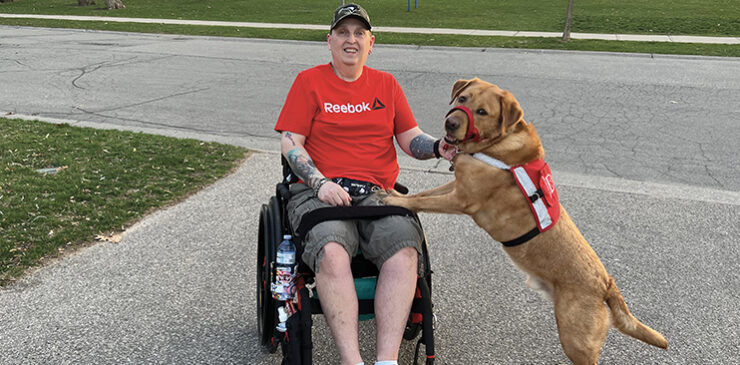Recognizing that you may need access to various methods to help you overcome and cope with your feelings is the first step in building a support system that will assist you: your mental health toolbox.
Phil Raney has stocked his toolbox well. Having sustained a spinal cord injury over 25 years ago, he has had almost three decades of experience and knows well the battles you face within your own mind. Unfortunately, this wasn’t always the case. Learning to recognize that he was struggling took some time, “I think most people who battle depression, when you’re in it, you don’t necessarily see it,” he says. It was his wife who forced him to address how he was feeling. Phil was sleeping a lot and had no interest in food, so he dropped a lot of weight. He knew something wasn’t right but wasn’t sure what was happening. He was in the middle of a severe bout of depression. After years of dealing with the physical issues associated with his injury, it was time to address the mental ones. Phil’s mental health wasn’t a priority for his doctors at the time of his injury. His surgeon suggested that he might benefit from working with a psychiatrist, but his family doctor gave this no credence. Phil realized he had to reach out and find ways to help himself to build a life with spinal cord injury. He realized he needed “something more to life than sitting around the house.”
 Take Care of the Physical
Take Care of the Physical
Phil’s injury had led to multiple surgeries to fuse discs and vertebrae including fusing his neck from the C4 to C7 level leaving him with limited neck movement. It also left him in constant pain. Dealing with the pain led to other complications, such as stomach issues, but the bigger problem was the impact of the drugs on his life. “For several years, they had me on Fentanyl, which was life stealing. It just robs you of your whole life,” Phil says. After years of this, he found a new pain specialist who introduced a new drug regimen that helped him cope with the pain level without turning him into a zombie. Phil has also found relief through non-medical solutions such as mindfulness. Through one of SCIO’s Peer Connections, he learned about the Healthy Minds app and now uses it regularly.
Phil has reduced the risk of pressure injuries, often common among people with limited mobility. With diligent attention paid to pressure points and help from his brother, a wound care nurse, he has avoided new pressure injuries for a few years. Minimizing the impact of secondary complications helps the overall health and wellness of people with SCI.
The benefits of physical activity have also been life-changing for Phil. He participated in a study through Parkwood Institute on the impact of physical activity on people with SCI. The 10-week program included boxercise three days a week. The group of participants so enjoyed the program that they continued privately once the study was finished. They enjoyed encouraging each other and spending time together. Now Phil is involved with another exercise program and has activities planned out five days a week, including; high-intensity yoga, aerobics and full body circuit. The activities help structure his day, keep him connected with others and aid with physical fitness and functionality, improving his mental health.
 Change the Narrative
Change the Narrative
Phil discovered Cognitive Behaviour Therapy through research that was being promoted through SCIO. The program, created through the Lawson Institute, was an internet-based program that put Phil in touch with a therapist to reframe his thoughts. “It absolutely changed my life,” Phil says. “It helped me change the negatives to positives” While Phil had been working with an excellent Psychiatrist for years, the added benefits of CBT brought additional support when Phil struggled. Reframing his outlook helped him deal with the frustrations that led to anger. “You can get buried too deep in your thoughts,” he says and finding a way to put things in perspective and look at situations in a different light has been a transformative experience.
 Man’s Best Friend
Man’s Best Friend
Some of Phil’s support comes with four paws. Rutger is Phil’s service dog and provides practical help, fetching and carrying, along with emotional support. Rutger is always by Phil’s side, ready to be of service. In addition, Phil has helped organize fostering for service dogs so that others can reap the benefits of a four-legged friend like he has.
 Faith and Service
Faith and Service
Phil says his faith keeps him centred and grounded. In his darkest days, it has helped him recognize that others do not have the advantages he has, so he takes time to help where he can. He has been a member of the Lion’s Club for 14 years and their motto is “We Serve,” which Phil takes to heart. “There’s nothing better than helping somebody else,” he says, “it puts your own issues into perspective.” Service and faith help to build a sense of community that supports others.
 Advocacy
Advocacy
Advocating for others who do not have the benefits he has helps Phil deal with the frustration and anger that comes when he sees and lives with the challenges faced by people with disabilities. He is thankful for his circumstances and that his former career as a corrections officer afforded him good benefits. “I have never felt sorry for myself,” he says. However, seeing the enforced poverty of friends who are on ODSP makes him angry. He witnesses the impact of the lack of services on others and the toll it takes on their mental health as they slip through the cracks of a flawed system. “Why is it taking so long to make this province accessible?” he says. Why indeed. He believes education is critical to gaining the support of the broader community. People unfamiliar with the challenges faced by those with disabilities don’t understand the issues. Educating them helps to bring more awareness and calls for change.
 The Power of Peers
The Power of Peers
One of the greatest struggles after his injury was the social isolation that Phil felt. He had always been active and involved and had a busy social life with friends. This changed after his injury. Being unable to visit his friends because of inaccessibility and not wanting to sit on the sidelines to watch others participate in activities he could no longer do led to losing friends. Many didn’t understand what he was going through. Connecting with those that did understand helped Phil immensely. Those who had lived experience with spinal cord injury understood Phil’s journey as they had been through a similar one. Supporting and encouraging others provides comfort and joy to Phil. They cheer each other on, celebrate successes together, commiserate, and find solutions when faced with challenges. The power of connection through lived experience is an invaluable tool for Phil.
 Love and Laughter
Love and Laughter
Surrounding himself with his family is the best tool in Phil’s toolbox. His wife, two children and two grandchildren are an immense source of comfort and joy for him. “I can’t imagine not having my family,” he says. He speaks with love of his wife who pushes him when he needs it, and his pride in his children. His face lights up when he talks of his grandchildren, including the youngest, who he laughingly describes as a “little hellion”. Laughter is also important to Phil. “Humour goes so far,” he says with a big laugh.
While much of the focus is on the physical when you have a spinal cord injury, taking care of the mind is critical. As Phil says, “If you’re struggling between the ears, the rest of your body isn’t going to feel well either.” Life can be challenging for everyone, whether you have a disability or not, but there are many ways to help yourself and others if you use the right tools for the job.






